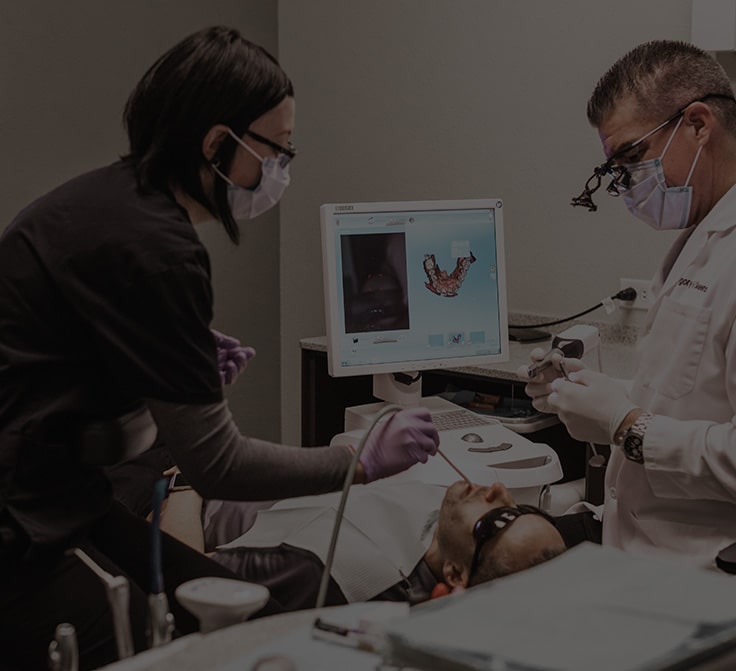
Oral cancer is a serious condition, but if diagnosed early, is very treatable and manageable. In fact, oral cancer that is detected early has an over 80 percent five-year survival rate compared to the overall cancer five-year survival rate of 59 percent. Many people are surprised to learn that oral cancer exists and that there are risk factors that can increase your chances for developing it. Fortunately, if you attend routine dental visits at Skeens Family Dentistry, your dentist can educate you on what you can and cannot prevent.
How is oral cancer diagnosed?
If your dentist suspects oral cancer, you may be referred to an oral pathologist or oral surgeon for a biopsy. A thorough oral cancer screening is completed at your yearly dental exams to look for any suspicious changes to your oral cavity. The American Dental Association (ADA) recommends that dental professionals document and follow-up on any pathological changes they observe during yearly clinical exams.
A complete medical history will be taken and an oral biopsy will be performed of any abnormal areas of your mouth. A pathologist will determine if the tissue is cancerous, precancerous or benign. You may also be referred for diagnostic imaging like a Panorex, CT and MRI to get more details about your diagnosis. Your results will be assigned a stage of oral cancer depending on the severity.
What is oral cancer?
There are several different types of oral cancer that can affect the mouth. This may include cancer of the tongue, gingiva, floor of the mouth, lips, cheek mucosa, and hard/soft palate. Your dentist will perform a comprehensive oral cancer screening to examine all areas of the mouth to evaluate if there are any noticeable changes in your mouth. This may include pigment changes, lesions, bony protrusions, ulcercations, and swellings.
The most common type of oral cancer is squamous cell carcinoma. Other common types of cancer are salivary gland carcinoma, veracious carcinoma, oral melanoma, and lymphoma. Benign types of cancer do exist too. Most of the time, benign lesions will be surgically removed and biopsied.
What are the symptoms of oral cancer?
Oral cancer symptoms may vary person to person, but some of the most common symptoms include:
- Unusual growth or mass
- Ulcer or sore that won’t heal
- Lump in neck or under the tongue
- Bleeding
- Numbness
- Painful swallowing
- Loose teeth
- White or red patch
Since many symptoms can mimic both benign and serious conditions, it is important to follow up with your dentist for routine care. This is why oral cancer screenings are equally, if not more important than just simply checking for tooth decay.
What are the risk factors for oral cancer?
The most common risk factors to develop oral cancer are smoking (cigarettes, pipes, chewing tobacco) and excessive alcohol consumption. Both are six times more likely to develop oral cancer than non-smokers and non-drinkers. The combination of smoking and alcohol consumption increases your risk for oral cancer even more than the other two risk factors alone.
People who chew betel quid or gutka also increase their risk in developing oral cancer. Other risk factors are immunocompromised individuals, excessive sun exposure and use of tanning beds (melanomas), a history of HPV, and a family history of cancer.
What causes oral cancer?
Like many cancers, oral cancer is caused by mutations to DNA. Most oral cancers will begin as flat and thin cells called squamous cells. Smoking and alcohol consumption is associated with a p53 gene mutation in squamous cell carcinoma.
Although parents can pass down gene mutations, oral cancer is not an inherited condition. Instead, it is more likely to develop oral cancer if you carry higher risk genetic markers and make lifestyle choices like smoking or alcoholism.
What are the treatment options for oral cancer?
Common treatments for oral cancer in Encinitas include surgical resection of the tumor or growth, radiation therapy, chemotherapy, immunotherapy, and targeted drug therapy. Treatment will depend on the stage of cancer and if it extends to the lymph nodes.
What is the prognosis for oral cancer?
The prognosis of oral cancer depends on the stage of diagnosis: Early diagnosis usually associated with more successful prognosis. Visiting Skeens Family Dentistry regularly will help for early detection, diagnosis and treatment if needed.







 LEARN MORE ABOUT OUR GUIDING PRINCIPLES AT ENCINITAS FAMILY DENTISTRY
At our core, Encinitas Dentistry is a dental practice devoted to restoring and enhancing the natural beauty of your smile. How we accomplish that goal is what makes us stand out. We mingle time-tested approaches to oral care with state-of-the-art technology and procedures to deliver beautiful, long-lasting smiles!
LEARN MORE ABOUT OUR GUIDING PRINCIPLES AT ENCINITAS FAMILY DENTISTRY
At our core, Encinitas Dentistry is a dental practice devoted to restoring and enhancing the natural beauty of your smile. How we accomplish that goal is what makes us stand out. We mingle time-tested approaches to oral care with state-of-the-art technology and procedures to deliver beautiful, long-lasting smiles!